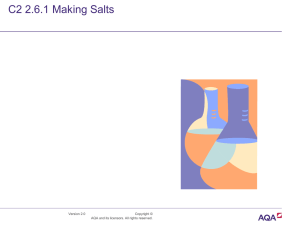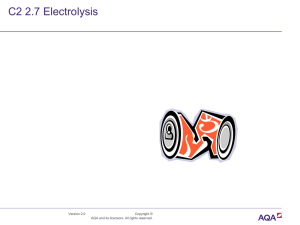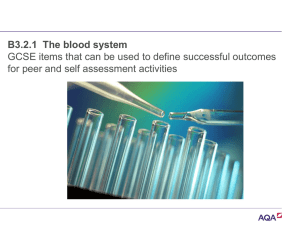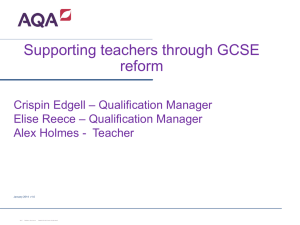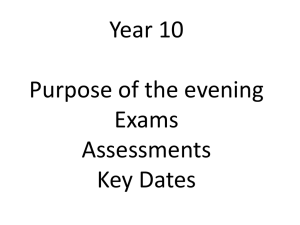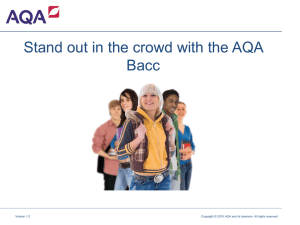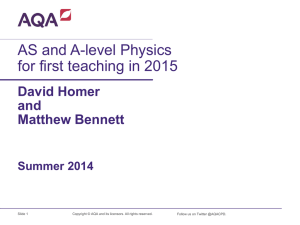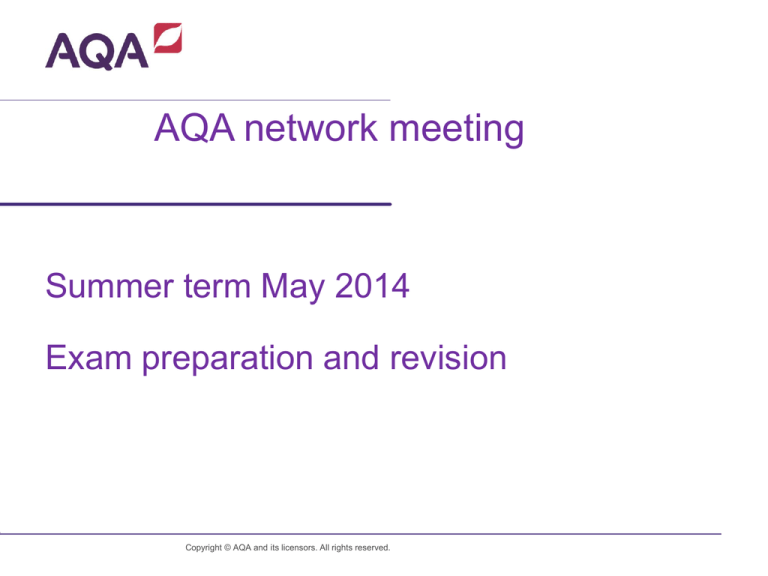
AQA network meeting
Summer term May 2014
Exam preparation and revision
Copyright © AQA and its licensors. All rights reserved.
Agenda
• AQA updates GCSE & A level – Curriculum Advisor
• Revision and exam techniques - AQA
Copyright © AQA and its licensors. All rights reserved.
Updates GCSE
• Certificates (IGCSE) now in the performance tables
from 2016.
They will be equivalent to the Biology , Chemistry and Physics GCSE so
will count in the EBacc part of the Progress & Attainment 8. The Science
Certificate : Double Award will count for two slots within each of these
performance tables.
• Reform science criteria still with DFE for further
consultation
• 10% direct assessment of practical skill still in proposal
Copyright © AQA and its licensors. All rights reserved.
Update A-level
• New Assessment Objectives for sciences, based on the
current GCSEs
• 60% of the subject content is the same for all boards.
• At AQA there is very little change to the rest of our
subject criteria.
• The expected outcomes are the same: the same
students would get the same grades before and after
the changes.
Copyright © AQA and its licensors. All rights reserved.
A-level assessment objectives
What has changed?
• All A-levels are now linear.
• AS will be standalone – won’t contribute to A-level grade – could be
co-taught
• Questions will require the use of Level 2 mathematical skills: 10%
Biology, 20% Chemistry, 40% Physics.
This might have an impact on entry requirements.
Our present specifications already cover maths to a similar level as
these percentages so minimal change should be seen by centres .
• AQA A-level specifications submitted to Ofqual June 2014
• Draft specifications & SAMs will be available summer 2014.
• Teacher support events summer /autumn 2014
Copyright © AQA and its licensors. All rights reserved.
Practical assessment
• Internal assessment of practical skills will no longer
contribute to A-level grade
• Endorsement for practical skills – 5 skills which can’t be
assessed on written paper. Pass or Fail (expectation is
majority will pass). Reported separately on the
certificate . Do not contribute to A-level
• There will be a list of at least 12 specified practicals that
all students will be expected to have done during the
course.
• Series of technical competencies for each subject
• 15% of questions in written papers will be about
practical work.
Copyright © AQA and its licensors. All rights reserved.
Timeline: Focus on Science
June
2014
Legacy
A-level Biology,
Chemistry, Physics
New
A-level Biology,
Chemistry, Physics
Sept
2014
June
2015
Last 2
years
teaching
AS
exams
Draft
specs in
schools
June
2016
Sept
2016
First AS
exams
Sept
2017
June
2018
First
A-level
exams
Last 2
years
teaching
Draft
specs in
schools
June
2017
Last AS
and A2
exams
First
teaching
Legacy
GCSE Science
New
GCSE Science
Sept
2015
If triple over three
years Start teaching from
draft
Copyright © AQA and its licensors. All rights reserved.
Last
linear
GCSE
First
teaching
First
linear
GCSE
Revision lessons – explanation of slides
The table on next slide shows some of the common activities teachers use
with students to make revision engaging and fun. Examples of these are taken
from various sources mainly TES and teachit (in purple).
Where possible we have attributed the work to the contributor but as many
examples on the TES only refer to themselves by a login name it is not always
possible to attribute the work to a school or teacher.
The resources shown are used to exemplify activities current teachers are
using in the classroom.
Teachit is a useful vehicle that AQA centres can use to share their resources.
All resources on the site have gone through editing and DTP process before
being published.
The problems students may face, are learning large amounts of content for the
linear exams. Therefore small regular chunks of revision and using progress
tests are key. However, for Year 11 how to compile a summary of content is
high priority. Placemats are useful as a confidence booster to look at the night
before and morning of the exam, other wise students can become
overwhelmed by the enormity of the task .
x of x
Version 3.0
Copyright © AQA and its licensors. All rights reserved.
Revision lessons
Revision lessons need lots of short engaging activities. Different sorts of
quizzes are a good way to break things up, with literacy activities planned into
the lesson to break the learning up in to small sections.
Embedding understanding of key words and definitions is essential so any
short activities that engages pupils in this are very useful . There are many
examples and the table just aims to capture a few old favourites
x of x
Version 3.0
Copyright © AQA and its licensors. All rights reserved.
Revision lessons
You can use games like Snakes and ladders to get the students to make up
the questions and answer cards.
The Jigsaw games from teachit are a nice take on learning diagrams
especially as they are student drawings, but you could just as easily do them
for standard diagrams .
•
•
•
•
•
Refer to crosswords in pack – from teachit site - keywords and definitions
glossary are found in textbooks
Bounce – demo – interactive version of splat – always good fun
Catchphrase – one of my favourites – demo next slide – shows don’t need
to be glossy expensive resources to do the job, what is important is getting
students to be comfortable using the correct scientific language
Interactive hangman – under practical skills language of science
crossword or rock activity
For high ability students, connection game encourages students to explain
connections between scientific words which demonstrates and assesses
real understanding at a higher level.
x of x
Version 3.0
Copyright © AQA and its licensors. All rights reserved.
Explanation of revision ideas
Once you have your set of key words and definitions (glossaries in text books)
there are various literacy games you can plug them in to. There are the staple
crosswords or a nice interactive take on splat is teachit bounce.
Catchphrase– demo slide 13 – shows resources don’t need to be glossy &
expensive to do the job, what is important is getting students to be comfortable
using the correct scientific language .
Interactive hangman –on teachit is another fun game.
x of x
Version 3.0
Copyright © AQA and its licensors. All rights reserved.
Revision and exam techniques
• Categories of materials
Learning
content
Summary of content
Key words &
definitions
Blockbuster
Placemats
Crossword
Who wants to
be a millionaire
Spider diagrams
Word search
True False quiz
Key word cards turnover
Splat / Bounce
Bingo
Sequencing processes or Anagrams
images
Catchphrase
Snakes &
ladders
Jigsaws
Creating a Wiki
Connections game
Strategy game
http://www.wikispaces.com/
Hangman
Copyright © AQA and its licensors. All rights reserved.
1
3
2
TES contributed by cath1975
AQA B2 Cells catchphrase
I use this as a starter to a revision
lesson on the cells topic. The pupils
love them. They have to guess the
keyword using the visual clues and
then give a definition.
cell membrane
Selection of online resources you might find
useful
How about setting up your own revision video
playlist for your students? You can tailor the videos
to topics that your pupils need help with. Check out
the Planet Science YouTube playlists for inspiration
GCSE Bitesize - A classic
revision aid with subject
overviews, interactive
activities and questions on a
variety of topics.
AQA specific
resources
A-level resources
video lessons
Secondary Science
Resource Collections
TES Games for Grades - A
collection of the most popular
revision games and activities on
TES Science.
Copyright © AQA and its licensors. All rights reserved.
Examination Techniques
• Underline command word
• Know what your command words mean –
explain – connectives & linked statements
evaluate – comparisons , consider evidence for &
against & come to a conclusion
calculate - use equations sheet, check significant
figures, check units
• mark a minute
• use the mark schemes for teaching activities
• use pupil responses from ‘feedback from exams’ add
wish and a star (EBI)
Copyright © AQA and its licensors. All rights reserved.
Examination Techniques
Quality of Written Communication Questions
plan answer in rough:
– list key words to include
– address each bullet point of the question
– divide page in three - advantages & disadvantages &
conclusion
– use question to inform and support
– read through at the end to check answered all points
– practice using a writing frame
Copyright © AQA and its licensors. All rights reserved.
Useful AQA resources – all available on website
(SKM)
• ‘Feedback on exams’- found in teacher support on SKM.
Pre & post conference handbook – pupils answers and
examiners responses to mark allocation
• Questions and students responses and examiner comments
from launch meeting
• Command word document
• Explanation of terms
teaching guidance AQA website
• QWC booklet
• Exampro
Copyright © AQA and its licensors. All rights reserved.
Support list
Subject department:
GCSE
Sciences-gcse@aqa.org.uk / 01483 477 756
A level
Science-GCE@aqa.org.uk / 0161 958 3859
Coursework Administration
courseworkadmin@aqa.org.uk / 01423 534 455
e-AQA
http://web.aqa.org.uk/help/eaqa.php
You can access Secure Key Materials (SKM) via eAQA. Login using the password for your school which you can obtain
from your Examinations’ officer.
Enhanced Results Analysis (ERA)
http://www.aqa.org.uk/about-us/what-we-do/products-and-services/enhanced-results-analysis
Exampro
http://www.exampro.co.uk
Online course booking:
https://coursesandevents.aqa.org.uk
in-school CPD
http://www.aqa.org.uk/professional-development/in-school-training
TOLS (Teacher Online Standardisation)
http://www.aqa.org.uk/about-us/what-we-do/products-and-services/teacher-online-standardisation
Exam change essentials
http://www.aqa.org.uk/news-and-policy/supporting-education/exam-change-essentials/exam-change-essentials-resources
Copyright © AQA and its licensors. All rights reserved.
Thank you
Copyright © AQA and its licensors. All rights reserved.

